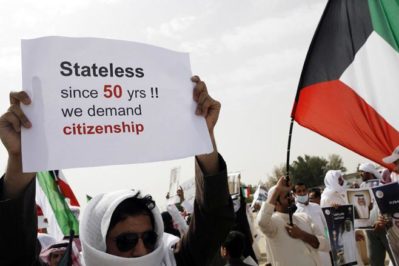Kuwait is home to one of the largest groups of stateless people in the world: the Bidoon. Bidoon is a literal translation of the Arabic word for ‘without’, as it refers to being without a state or nation. More than 100,000 Bidoon live in Kuwait. The Kuwaiti government purposely avoided giving the Bidoon people citizenship following the formation of Kuwait’s constitution in 1962, despite most Bidoon tracing their family back hundreds of years. Even though the Kuwaiti government has promised to solve the statelessness problem in the country, there has been little improvement in the situation. Instead, since the 1980s, the Kuwaiti government has targeted the Bidoon through mass arrests, detention, and other extra-legal attempts to curtail public and civil society efforts that advocate for the rights of the Bidoon. Furthermore, they are deemed to be illegal residents and face severe restrictions of their basic human rights, including in access to education, healthcare, and employment.
The Kuwaiti government has cracked down recently on human rights defenders who have been advocating for the Bidoon. Kuwaiti authorities have arbitrarily arrested more than a dozen protesters including the human rights defender Abdulhakim al-Fadhli, in a crackdown on peaceful protestors demanding greater rights for the Bidoon.
Front Line Defenders reports that Abdulhakim al-Fadhli has been targeted by the Kuwaiti government and arrested over five times for his activism on behalf of Kuwait’s stateless Bidoon. He is a major human rights activist who advocates for the rights of the Bidoon community in Kuwait.
According to Amnesty International, the series of arrests took place between 11 and 14 July following demonstrations held by members of a Bidoon group that protested in Kuwait City. The protests were a response to Ayed Hamad Moudath’s death, a twenty-year-old boy who committed suicide due to his frustration over being denied identification papers allowing him to study, work, and obtain access to public services.
Abdulhakim al-Fadhli is just one of the fifteen Bidoon activists who remain in prison as a result of participation in the demonstrations, and he and several other activists led a hunger strike in prison despite reports of the authorities’ attempts to force feed them. The other incarcerated activists are: Ahmed al-Onan, Anwad al-Onan, Abdullah al-Fadhi, Mutaib al-Onan, Mohammed Khudair al-Anzi, Yousif al-Osmi, Nawaf al-Bader, Hamid Jamil, Yousif al-Bashing, Jarallah al-Fadhli, Ahmed Shaya al-Anzi, Hamoud al-Rabah, Khalifa al-Anzi, and Reda al-Fadhi.
Furthermore, the activists remained in the custody of the State Security agency for quite some time before their transfer to a public prison, even after the interrogations ended. It is widely believed the authorities keep activists detained away from official government prisons until signs of ill treatment and torture disappear, as official prisons only accept new inmates after a medical examination.
Human Rights Watch reported the charges against the activists include spreading fake news, harming allied countries, joining a group that calls for the destruction of the country’s basic systems, calling for attacking national interests, calling for public gatherings, and use of cellphones for abusive purposes.
In order for civil dialogue to occur, it is absolutely necessary for Abdulhakim al-Fadhli and the other 14 activists to be freed from prison. This unjust treatment of activists who advocate for the rights of a stateless minority is just one example of the various human rights violations the Kuwaiti government commits each day.





